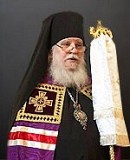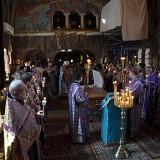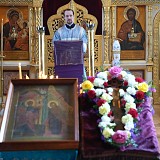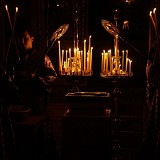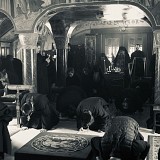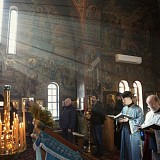Your Eminence, Fathers, conferencees!
It’s wise to search the Scriptures and especially the Gospel for guidance before beginning any new task. What does the Gospel say that gives direction for the topic of culture and Orthodox living?
I believe the following quote from the Gospel is appropriate, “And no man putteth new wine into old bottles; else the new wine will burst the bottles, and be spilled, and the bottles shall perish. But new wine must be put into new bottles; and both are preserved. No man also having drunk old wine straightway desireth new: for he saith, The old is better.”
St Paul in his epistle writes, “The natural man does not accept the things that come from the Spirit of God. For they are foolishness to him, and he cannot understand them, because they are spiritually discerned. The spiritual man judges all things, but he himself is not subject to anyone’s judgment.”
St. Philaret of Moscow wrote, “The critics think in vain that the faith of Christ is hostile to knowledge. It is not hostile to true knowledge, only because it is not in union with ignorance."
What is understood by “culture”? Here are a few definitions.
Culture is, “Enlightenment and excellence of taste acquired by intellectual and aesthetic training.” “Acquaintance with and taste in fine arts, humanities, and broad aspects of science as distinguished from vocational and technical skills.”
“Culture is the characteristics and knowledge of a particular group of people, encompassing language, religion, cuisine, social habits, music and arts. ... The word "culture" derives from a French term, which in turn derives from the Latin "colere," which means to tend to the earth and grow, or cultivation and nurture.” “Excellence of taste in the fine arts and humanities, is also known as high culture.” “Culture enhances our quality of life and increases overall well-being for both individuals and communities.”
Culture is the sum total of how we live, including our world outlook, opinion, everything that characterizes our behavior, makes up our identity. If we accept this definition, this approach to the topic, it’s obviously something all encompassing, the whole of life.
Referring back to the quote from the Gospel. How could culture relate to the words of our Savior? The Fathers explain the meaning to be about the spiritual life, that one needs experience before forging ahead into something higher. St John Chrysostom writes, “The disciples have not yet become strong,
but still need much condescension. They have not yet been renewed by the Spirit, and on persons in that state one ought not to lay any burden or injunctions.” And further, “And when the disciples should receive as disciples those of all kinds of people that should come from the whole world, they might deal with them very gently...before the time nothing austere and grievous ought to be imposed on them.” Concerning the formation of a soul, St John Chrysostom compares it to a painter, “Seest thou not the painters, how much they rub out, how much they insert, when they are making a beautiful portrait? Well then, do not thou prove inferior to these. For if these, in drawing the likeness of a body, used such great diligence, how much more were it meet to us, in fashioning a soul, to use every contrivance.”
In brief, the spiritual life needs to be approached slowly, gently, with experience. Other Fathers repeat frequently that one needs to cleanse one’s heart of sinfulness, all passionate movements before the new wine of the Spirit can be poured in.
For many even the above explanation might seem too abstract, or distant, unattainable, out of range, or simply not understandable. Can we begin to speak about prayer of the heart, stillness, cleansing of the eye of the soul, the nous to someone who is engrossed in video games, social media, obsessively texting, perhaps can’t even sign their name because cursive writing is no longer taught, or read a clock with hands on the wall since many can only read a digital clock on their phone?
There is a solution, difficult although not as daunting as reading the Philokalia or any advanced book about the spiritual life.
What can be done if there is no old wine skin or old garment, or no garment at all? Just an empty barrel. What to do if one’s belief system, one’s culture has been heavily or exclusively impacted by the ever prevalent fornication culture, wall-mart -plastic-land -culture, persistent fake news, if the only music one knows is a thumping, frantic rhythm accompanied by 5-6 repeated words, or a cascade of x- rated lyrics. Not being able to string three sentences together without using words like, woke, yolo, savage, kewl? Or needing a special app to teach you how to write intelligible texts or the one you wear on your wrist that indicates if you are compatible with the person you are having dinner with, since you've lost the criteria to monitor your or others’ emotional pulse?
An analysis of what’s happening now, describing the contemporary mindset, a cross section of the general public’s psychological profile is thought provoking. There are many studies, books, blogs etc. dealing with these issues. Here we need to agree that generally what people now live by, their motivations, tastes, world outlook, is not very compatible with the understanding of salvation offered by Orthodoxy.
The answer is not bringing Orthodoxy up to date, quite the opposite. My understanding is that people don’t want the boring, superficial, mundane, trendy in their religion. Already saturated with everything that is driving them to psychotropics, suicide. They thirst for mystery, transcendence, otherworldliness, something genuinely different, enchanting, soul-satisfying, eternal, enriching, substantial, cosmic, that which moves them to their very core. But it’s difficult to transition from hip hop and chartreuse spiked hair to a salvific experience of Orthodox in one leap.
Don t be mistaken, everyone is welcomed and sought out by Christ, tats, spikes, piercings and all.
Father Seraphim Rose offered the concept of a gradual formation of the soul as a possibility to bridge the gap. This in fact was nothing new, but understood by the Fathers, and implied by the words of Christ the Savior quoted above.
So, where do we begin? By exploring the affirmed useful models of the past and learn to discern what is also good in the present situation. And at the same time, if we are being grounded in Orthodoxy, in the spiritual life, we can better discern these models. The Lord in the Gospel says you know the signs of weather changes but you can’t discern the signs of the times. The Church can teach how to read the signs.
This process of enhancing our lives by reexamining culture though an Orthodox context requires commitment, a firm resolution. The all-pervading atmosphere of indecisiveness we live in makes this a daunting task, especially where there’s little firm commitment to marriage, friendship, your school, the place where you live etc. But here there is no choice. The process will not work, this will not be successful if you don’t make a resolution to persistently work on it.
Fr Seraphim Rose has expressed that the issue, “ lays in the poverty of our modern soul, which has not been prepared or trained to receive the depths of true Christian experience. There is a cultural as well as a psychological aspect to this poverty of ours: The education... today,... is notoriously deficient in developing responsiveness to the best expressions of human art, literature, and music, as a result of...people are formed haphazardly under the influence of television, [social media] rock music, and other manifestations of today’s culture... [thus[–the soul of a person who has survived the years of youth is often an emotional wasteland, and at best reveals deficiencies in the basic attitudes towards life that were once considered normal and indispensable.”
St. Theophan the Recluse writes in his book, “What the Spiritual Life Is and How to Attune Oneself to it”,
”Human life is complex and many-sided. In it there is a side of the body, another of the soul, and another of the spirit. Each of these has its own faculties and needs, its own methods and their exercise and satisfaction. Only when all our faculties are in movement and all our needs are satisfied
does a man live. But when only one little part of these. faculties is in motion and on]y one little part of our needs is satisfied–such a life is no life...A man does not live in a human way unless everything, in him is in motion .... One must live as God created us, and when one does not live thus one can boldly say that he is not living at all”
You ask, body, soul, spirit. How are these to be understood? Saint Theophan continues, “A man has three layers of life: that of the spirit, of the soul, and of the body. Each of these has its sum of needs, natural and proper to a man. These needs are not all of equal value, but some are higher and others lower; and the balanced satisfaction of them gives a man peace. Spiritual needs are the highest of all, and when they are satisfied, then there is peace even if the others are not satisfied; but when spiritual needs are not satisfied, then even if the others are satisfied abundantly, there is no peace. Therefore, the satisfaction of them is called the one thing needful.”
“When spiritual needs are satisfied, they instruct a man to put into harmony with them the satisfaction of one’s other needs also, so that neither what satisfies the soul nor what satisfies the body contradicts spiritual life, but helps it; and then there is a full harmony in a man of all the movements and revelations of his life, a harmony of thoughts, feelings, desires, undertakings, relationships, pleasures. And this is paradise!”
I recently read an autobiography of Carl Jung the famous psychologist and was surprised to discover that he strongly disagreed with Freud on the issue of sexuality. Jung contended that Freud’s fixation on the sexual was a mistake. Jung believed that the strivings of the spirit in man must be taken into consideration.
There's a great danger in neglecting the needs of the soul, the formation of a rich, properly ordered emotional, psychological life. This can be remedied, enhance by contact with, absorbing, all that is truly valuable, good , useful enriching in the cultural legacy of human endeavors throughout time. In short, we need to restore cultural memory through the humanities while sadly though it is being discarded in the universities and replaced by gender studies, computer science etc.
Trying to leap into the pure, clear, ethereal atmosphere of genuine spiritual life without a firm, normal human foundation can be very disorienting, disappointing, a serious disconnect for one who does not fully understand how to navigate where the “air is rare”. Some argue against such an approach telling us that that this is all worldly even demonic. However, the Fathers of the Church disagree.
Find time to read in its entirety St Basil’s, “Address to Young Men on the Right use of Greek Literature.”
Here are some brief quotes to illustrate his position on secular culture, “But on the other hand we shall receive gladly those passages in which they praise virtue or condemn vice. For just as bees know how to extract honey from flowers, which to men are agreeable only for their fragrance and color, even so here also those who look for something more than pleasure and enjoyment in such writers may derive profit for their souls. Now, then, altogether after the manner of bees must we use these writings, for the bees do not visit all the flowers without discrimination, nor indeed do they seek to carry away entire those upon which they light, but rather, having taken so much as is adapted to their needs, they let the rest go. So we, if wise, shall take from heathen books whatever befits us and is allied to the truth, and shall pass over the rest. And just as in culling roses we avoid the thorns, from such writings as these we
will gather everything useful, and guard against the noxious.12 So, from the very beginning, we must examine each of their teachings, to harmonize it with our ultimate purpose”
And further he writes, “To speak generally and so far as your needs demand, purity of soul embraces these things: to scorn sensual pleasures, to refuse to feast the eyes on the senseless antics of buffoons, or on bodies which goad one to passion, and to close one's ears to songs which corrupt the mind. For passions which are the offspring of servility and baseness are produced by this kind of music. On the other hand, we must employ that class of music which is better in itself and which leads to better things, which David, the sacred psalmist, is said to have used to assuage the madness of the king. Also tradition has it that when Pythagoras happened upon some drunken revelers, he commanded the flute- player, who led the merry-making, to change the tune and to play a Doric air, and that the chant so sobered them that they threw down their wreaths, and shamefacedly returned home. Others at the sound of the flute rave like Contestant and Bacchantes. Even so great a difference does it make whether one lends his ear to healthy or to vicious music.” And finally, “For the journey of this life eternal I would advise you to husband resources, leaving no stone unturned, as the proverb has it, whence you might derive any aid. From this task we shall not shrink because it is hard and laborious, but, remembering the precept that every man ought to choose the better life, and expecting that association will render it pleasant, we shall busy ourselves with those things that are best. For it is shameful to squander the present, and later to call back the past in anguish, when no more time is given.” In other words, you’re out of time.
The challenge for all of you is to explore, to expose yourselves to all that is good and beautiful in the legacy of the humanities throughout world culture. This includes classical music, drama, the best in literature, poetry, inspiring movies, painting, the study of world history perhaps using Fr Seraphim’s
“Orthodox Survival Course” as a guide. It’s not likely that you will find such exposure in the present school systems. In a course I was taking at SUNY Albany pursuing a Doctorate in Humanistic Studies the professor explained that he was glad it was the last class of his career since the school had summoned him 10 times to various committee meetings only to ask his advice on how to eliminate more of the humanities courses from the university curriculum. I suggest you investigate inter library loan and get a series of music or art appreciation videos to self-educate alone or with a few like - minded friends. In literature look up lists of the hundred best classic of all times. Read them all and then follow the thread of lesser known classics. Some guidance might be useful in this as well. I’m willing to assist.
In all of this you will gain and learn vicariously, though other people’s lives the experience that 100 lifetimes could not give you. Everything we read, hear, experience, remains somewhere in our memory, our emotional-soul data base, and becomes part of us.
Nothing so immediately conveys a person’s emotional profile like music. When one listens to a piano concerto of Mozart, a Passion by Bach, a symphony of Rachmaninoff you are listening to the most intimate, and frequently most noble feelings of another human being. If you listen closely to the Kyrie in Bach’s B minor Mass you get the impression that it was almost arbitrary when it ended, so strong is the sense that he is conveying his experience of Eternity. It might have gone on forever. And even more, if you become sensitized and learn to listen better, you can hear the sum total of all the impression of the times that imprinted themselves on a composer’s soul. Literally you are transported to another time and engage in the life of another era. The same in literature.
In the classics, you can read about people’s behaviors, their reactions, their approach to life, their relationships that are frequently so far removed from what you are accustomed to that it might seem like pure fantasy. But it’s not. For example while reading a 19th century novel you read about a young man who finds himself in a room with the young daughter of his doctor who he’s waiting for to come downstairs, he begins to feel uncomfortable, he blushes, and feels guilty that somehow he has committed an impropriety for even being there in the room with her. Coming across such scenarios in the book you might think, “How ridiculous.” Could you imagine how it might be rewritten, conveyed in popular novel today? Better not imagine it!
A personal example of this kind of cultural experience is the following: When I was 12 years old, I read “1984” and it conveyed a powerful impression. This I understood as I read, is the Soviet Union and could become America someday. Later I took a course in Soviet history, afterwards I was part of a college trip to the Soviet Union when I was 19, and then the Communist system was very much alive.
Then on a choir trip to Europe while we were in East Berlin, I decided to go through “Check Point Charlie” to get a feeling for the “workers’ paradise” communist side. I read the major novels of Solzhenitsyn and other Soviet authors, the “Gulag” by Anne Applebaum, and as many of the lives of the New Martyrs of Russia as I could find. However only when I allowed myself to pay attention to some of the painful sounding music of Dimitry Shostakovitch did it all come into focus, and I was really able to feel what it was like to live under the Soviet system.
If the cultural experience is solid, useful, edifying, it will contribute to a richer life, and enhance an appreciation for the spiritual resources of Orthodoxy. Alexander Solzhenitsyn wrote, “It is not good enough simply to prove to someone that Christianity is true; if we are to have an impact for Christ we must also show that the faith is sweet. One of the ways we can do this is through cultural expressions that embody that sweetness, which show that Christianity is not only true, but lovely and desirable.”
Many of the greatest Father and Mothers of the Orthodox Church were among the most well educated and brilliant people of their times, the Three Hierarchs, St. Photios, St. Paul, St. Macrina, St. Catherine.
Archimandrite Cyprian Kern in his advice to future clergymen writes, “[The fathers] belonged to the refined elite of that epoch. Their creations are full of proofs taken not only from the writings of the earlier holy fathers, but also from the purely external evidence of heathen writers. They knew perfectly philosophy, rhetoric, mathematics, and music, i.e., everything that in the language of pedagogy of those days was called the "seven numbered art” or "trivium, quadrivium." Granting the superiority of spiritual preparation and piety, they did not fear at all that a secular education somehow would be able to keep them from piety and spirituality. And, in reality, neither their humility nor their faith or their prayerful efforts suffered because they knew Plato, Aristotle, Homer, Virgil, etc. Those who at least a little plunged into the study of patrology and read the works of the holy fathers cannot but be astonished with the erudition and high level of those whom they wish to represent as simpletons and obscurants. The enemies of Christianity Lucian, Celsius, and Julian wanted to represent them precisely so, but in reality, the holy fathers struck even the heathens with their "external" i.e. intellectual preparation. In monastery libraries they preserved not only assorted books on the lives of saints and ascetic collections. It is interesting, for example, that St. Anastasias of Sinai, a refined Hellenist and expert in his language, used expressions, which are located only in such rarely read works as scholium on Euripides or Aristophanes. In order to memorize such linguistic details, it was necessary to attentively read such books as now, probably, [some] will consider completely inappropriate for monastic reading. From the knowledge of Plutarch or Plotinus at that time, it is possible to draw a conclusion about our epoch as well. An acquaintance with contemporary philosophy, literature,
sciences and art can only raise a pastor in the eyes of his disciples, who desire to learn from a priest anything about one or another cultural phenomenon. For a priest such knowledge can only become a useful weapon in his missionary and apologetic activity. He can influence the flock only when he knows how this flock lives and what attracts it. The spirituality of a priest will not suffer, if he knows contemporary philosophical and literary trends.”
The above was written in different times when much of the emigre flock was well educated. We might now turn this around as guidance for you our present parishioners, as well as for future clergymen.
Here is an interesting moral-maxim quote, “An enlightened person is one that never expects either benefit or hurt from himself, but from externals. The condition and characteristic of an enlightened person is, that he expects all hurt and advantage from himself. The marks of one that is making progress are, that he censures no one, praises no one, blames no one, accuses no one, says nothing concerning himself as if he were somebody, or knowing anything: when he is, in any instance, hindered or restrained, he blames himself; and, if he is praised, he secretly laughs at the person who praises him; and, if he is censured, he makes no defense. But he goes about with the caution of sick or injured people, dreading to move anything that is set right, before it is perfectly fixed. He suppresses all desire in himself; he transfers his aversion to those things only which thwart the proper use of our own faculty of choice; the exertion of his active powers towards anything is very gentle; if he appears stupid or ignorant, he does not care, and, in a word, he watches himself as an enemy, and one in ambush.” Could you guess what Saint wrote those words? It sounds very Christian. Actually, they are the words of a pagan stoic philosopher Epictetus from 50 A. D. However, he was widely read and appreciated by many of the Holy Fathers and Orthodox Christians up to our time. They incorporated his thoughts and made them their own. This is just one explanation of the enormous riches of classical philosophy that is opened to you and which used to be the part of the curriculum of any institution of higher education and the hallmark of any educated person, to say nothing of educated clergy. The New Martyr Elizabeth whose life is probably known to many of you earned a doctorate in philosophy. Why would a German Princess, the granddaughter of Queen Victoria, married into the Russian royal family have a doctorate in philosophy? Why not?
Why, some might ask, put all this effort into pursuing the liberal arts, enriching oneself culturally? Pragmatically speaking what will it give you? A job, a better salary. Probably neither. However, can we see this pragmatic approach as something intrinsically problematic as Orthodox Christians if we are only focused on following the Gospel, and the commandments exclusively for what reward we might gain from ascetic practice. Although it might seem outdated and even odd, consider the contemplation
of what is true, good and beautiful for its own sake, St. Dionisyos the Areopagate writes about the contemplation of the Names of God as a means of achieving union with the Trinity. God he writes is: Beauty, Goodness, love, Zeal, Light, Wisdom, absolute Peace.
Concerning goodness he says, “Preeminent name for God; this goodness of God is responsible for all goodness in the world just as the sun is responsible, by its very act of being, for the light in the world... Good is the Cause and source of all else, too... the heavens, universe, time, light, measure, eternity, number, and order...The Good gives everything its light, precedes and transcends everything, and gathers and anticipates all things, it is the source of everything and unifies everything, renews and perfects everything, and redirects all things to the really real.
And concerning the Beautiful, “All beauty comes from the Beauty that is God; all harmony, sympathy, community come from beauty. Later, he includes all rest and all stirring, as well. It creates all things and calls all things back to it. “Beauty unites all things and is the source of all things.” “The Beautiful is therefore the same as the Good...” “...every source, all preservation and ending, everything in fact, derives from the Beautiful and the Good. Here is the source of all which transcends all sources, here is an ending which transcends completion. ‘For from Him and through Him and in Him and to Him are all things’ says holy scripture”.
He continues; “And so it is that all things must desire, must yearn for, must love, the Beautiful and the Good”. If we love the Beautiful, we are drawn to the Beautiful and thus desire it.
“The divine longing is Good seeking good for the sake of the Good” And we add and not for any particular pragmatic usefulness. But desirable for an Orthodox Christian.
These are very lofty concepts but not inaccessible. Why? because this is precisely what we are discussing here. Can you imagine that a deeper understanding and appreciation for what is good and beautiful as reflecting in culture we are directing you towards can be a stepping-stone to a better understand and leading to union with God?
St. Maximus writes that something of God’s majesties are in all of creation. If we don’t get our heads out of our i-phones, the social media trance, net flex, and so forth, we will never experience the delight, the soul satisfying experience of being able to see these majesties, and the Divine in our interaction with the Good, the Beautiful all around us and in the best of human creative endeavors.
One author reflects on this idea writing, “What is at stake is the formation of the soul. Being able to just be in the presence of beauty is central to coming to know God and to participate in the sacramental life. As students come to appreciate beauty for its own sake—independent of utilitarian goals—their souls
are prepared to receive God at a deep, pre-cognitive level... sensitivity to the beauty of material things prepares one's soul to become sensitive to the beauty of spiritual things. To learn to be still and silent in the presence of great beauty prepares one to be still and silent in the presence of great holiness.”
The immediate problem here is that we can no longer be alone, still, and silent. Without this skill none of the above will work for us.
And so we see that the witness of the Church from ancient times until our contemporary writers clearly encourages us to gain all that is possible not only from Scripture and the theological legacy of the patristic tradition but from all that we can gather from what is best in the vast reservoir of human cultural endeavor that can encourage, assist, enrich, and renew our old wine skins and the plastic, land styrofoam bottles of our souls as we struggle to pour into ourselves the purest gold of the Holy Spirit.
And if some say that this culture engagement could bring harm to your spiritual life a theological school professor answers, “One should answer that the cost to this spirituality, which can allegedly suffer from the touch of culture and science, is very small. Orthodox spirituality, we must remember, is far from being fragile, as many might fear.”
Put on the whole armor of Christ, not fairy wings...and you will be fine!
A few end thoughts:
We are advised to be ourselves, be yourself. Few understand what that might mean. In the best sense it should refer to some kind of true self-realization, where nothing deceptive remains in how we perceive ourselves. I suggest that this is not enough. You should try being something other than the real self that believe you have discovered. Otherwise there’s a danger of getting stymied, stuck in complacency. Insecurity creates fear of change.
Try detaching yourself from the habitual, the humdrum, what social media and fads dictate to you. Learn to say no without feeling guilty. Step away from it all. Orthodox Christian can make a new beginning all the time. We believe in the power of God, in miracles to move mountains but don’t believe He can change our character.
St Paul writes that at the end God will allow us to fall into delusion because we are no longer interested in the truth, and as a consequence we will believe a lie, fake news for example. We have perfection, at
fingertips, can touch it every day. You can become Christ,, He said “Ye are gods”, Fr Seraphim Rose, St Catherine. Possibilities are limitless. Create your own reality. We have ability to do this. Don't fall for the mantra “It can’t be done.” You will need some creativity to do this.
Monitor closely your feelings, words, actions, thoughts. Follow the eternal models, discover a different way within Orthodox parameters. Once you learn the rules, the guideposts, the map, you can develop yourselves in such a way that leads to a better end. Tread lightly. Don’t get attached to nonsense.
And it’s all mostly nonsense. Thank you!
